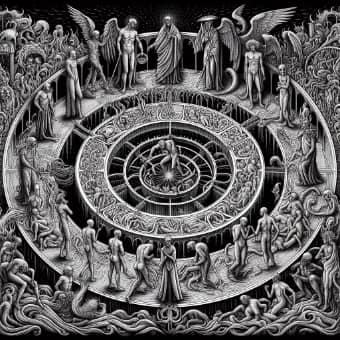Exploring the Depths of Dante’s “Divine Comedy”
Catholic literature
Dante Alighieri’s “Divine Comedy” is a profound Christian spirituality masterpiece that has influenced the literary world for centuries. Written in the early 14th century, this epic poem is not just a cornerstone of Italian literature but also a towering beacon in the global literary landscape.
Comprised of three parts—Inferno, Purgatorio, and Paradiso—the “Divine Comedy” offers a vivid journey through the three realms of the dead, allegorically reflecting Dante’s views on human nature, theology, philosophy, and morality.
This blog post contains affiliate links. When you click on a link on this page and make a purchase I may earn a small commission, at no additional cost to you. Thank you for your support.
The Structure of “Divine Comedy”
Inferno, the first part of the trilogy, describes Dante’s journey through Hell, guided by the ancient Roman poet Virgil. Here, Dante encounters the souls of the damned, each suffering in a fashion befitting their sins on Earth. The detailed and imaginative depiction of the infernal landscape challenges our understanding of divine justice and human ethics.
Following Inferno is Purgatorio, where Dante and Virgil ascend the Mount of Purgatory. Unlike Hell’s permanent damnation, the souls in Purgatory suffer for their sins with the hope of eventual purification and ascent to Heaven. This segment of the poem explores themes of repentance and the transformative power of suffering.
The journey culminates in Paradiso, where Dante, now guided by his beloved Beatrice, traverses the spheres of Heaven. In this realm, Dante encounters various saints and theologians. Paradiso is a complex exposition of scholastic philosophy and Christian theology, portraying a universe harmoniously ordered under God’s love.

Literary and Philosophical Significance
“Dante’s Divine Comedy” is not merely a poetic narrative; it is a comprehensive reflection on human life from the medieval Christian perspective. It presents an intricate blend of Dante’s personal life experiences, politics, and the comprehensive theological knowledge of his time.
The poem’s allegorical nature offers multiple levels of interpretation, from literal to anagogical.
The Christian spirituality work’s enduring relevance lies in its ability to merge intricate theological doctrine with universal human emotions and experiences. Dante’s characters are not abstract theological constructs but are full of individuality and psychological depth.
Influence and Legacy
The impact of “Divine Comedy” has been extensive. It has shaped the development of literature by influencing countless poets and writers, such as Geoffrey Chaucer, John Milton, and James Joyce. It has also left a stamp on visual arts, music, and popular culture, inspiring works from Sandro Botticelli’s drawings to contemporary video games and movies.
Moreover, Dante’s use of the vernacular Italian instead of Latin was groundbreaking, paving the way for Italian as a literary language. His work has been pivotal in the development of modern Italian language and literature.
Deepen your understanding of the Divine Comedy with your own personal copy. Grab your copy of The Divine Comedy today!”
Conclusion
Dante Alighieri’s “Divine Comedy” remains a monumental achievement in the history of Catholic literature. Its rich tapestry of metaphor, philosophical insight, and deep human empathy continues to resonate with readers today.
Whether seen as an allegory of the soul’s journey towards God, a commentary on Dante’s times, or a vessel of countless interpretations, the “Divine Comedy” stands as a testament to the enduring power of the human spirit to seek meaning and redemption.
Through its intricate narrative and philosophical depth, it challenges, delights, and enlightens readers across the ages and across the world.
